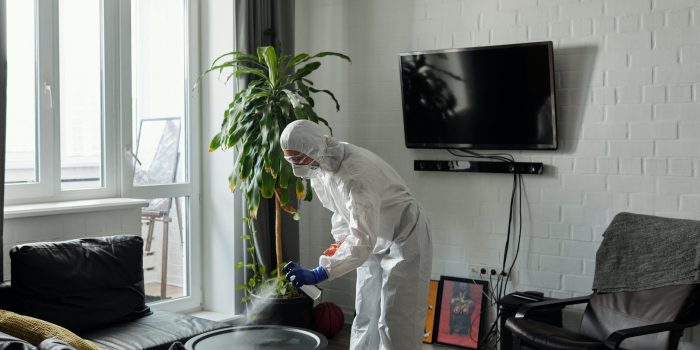If you’ve been a homeowner for long, you know that cleaning the house requires the correct cleaning gear. So get your costumes on and get to cleaning!
For individuals who hate cleaning, people at Merry Maids are more than willing to help you free some time on your schedule. Continue reading to find out more about what type of equipment you need to use during your cleaning crusade.
1. Face Mask
This is your best friend when it comes to cleaning. Not a lot of people have hypersensitivity to dust, but wearing a mask ensures you don’t inhale all kinds of harmful bacteria. A speck of dust can be anything – dead skin cells, a broken strand of hair, cloth fibers, dead insects (ew), and anything too small that can be considered dead or alive.
Just imagine millions of these floating around in your house and making their way into your lungs. It’s not a scene you’d want to be imagining, much less breathing it in.
As always, there’s a variety of face masks for very specific purposes. Ordinary cloth face masks make sure you don’t inhale dust from your home. There are face masks designed to filter out harmful spores from both bacteria and fungi.
There are even face masks that neutralize these threats once they make contact with its surface. To be safe, you can use N95 face masks, the very same face masks used to prevent COVID-19 transmission. N95 face masks prevent aerosolized particles (e.g. microbes in ultra-tiny droplets) from reaching your lungs.
2. Gloves
You will see that most cleaning professionals will wear some sort of glove, especially in areas that require wet cleaning. You will need corrosion-resistant gloves that protect the skin against bleach or irritating chemicals. These also protect the hand from dirty water and soap suds that contain a variety of bacteria.
Most gloves are either made of PVC or nitrile. The former is especially useful when cleaning bathrooms or kitchens as these areas require strong cleaning agents like bleach or strong acids. On the topic of which cleaning agents to use, look for our handy guide to cleaning agents article located on this website.
Nitrile gloves or hand shields are useful when dealing with food items you don’t wish to contaminate while cleaning. This can be worn in the kitchen area or when cleaning out the fridge, for example.
3. Aprons
There’s a reason why the French maid costume is popular in the media. The costume has a hat, gloves, and an apron. While professional cleaners may not actually conform to the media representation of maids, they will still wear aprons to minimize soilage.
Wearing aprons protect the midsection from spills or stains that arise from cleaning. It’s mostly used in areas that require wet cleaning. You will see these worn when cleaning tabletops and kitchen sinks as the body makes the most contact with these areas.
Aprons also come in a variety of styles and materials. Some aprons only cover the torso and don’t extend beyond the knees, while other aprons go lower. Aprons can also be made from regular cotton or other fabric, while others are made of PVC or synthetic fibers.
Aprons that are made from synthetic materials work well in guarding the body from spills that contain corrosive chemicals, so make sure you choose the correct one before working on an area.
4. Shoe Covers
In cases where aprons aren’t enough to cover the entirety of the body, shoe covers come in handy (or foot-y, get it?) to protect the wearer’s feet. Most shoe covers only protect the feet and don’t go up past the ankles, so it’s only really useful if you’re mopping the floor.
Some shoe covers are made from light textiles that are almost translucent, while others are made from clear plastic materials. These also help minimize the spread of dirt when cleaning an area.
They’re commonly required by hospitals, and you’ll see them worn by health care professionals that enter quarantine zones.
For homeowners, this eliminates the need to clean footsteps when moving from one room to the next.
5. Full-body suits
Last but not the least are full-body suits. They look like hazmat suits, albeit, a more lightweight version. If you’re hiring professional mold cleaners, they’ll come in your home wearing these. The reason is simple: mold spores are invisible to the eye and they can get past the spaces between cloth fibers.
They’re really only used when the area to be cleaned is considered a biohazard. As a homeowner, you don’t need to wear one, unless you’re a germaphobe, then we’d totally understand if you have one on occasion.
What do you think of this list? If you have any more suggestions, feel free to add your comments below!


